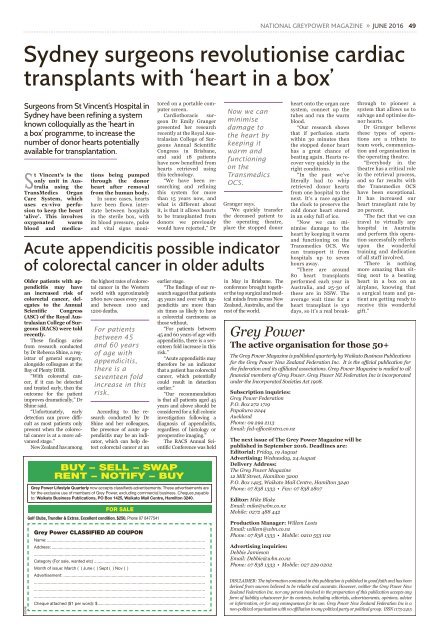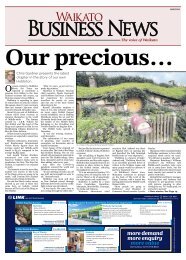Grey Power June 2016
The Grey Power Magazine is a prime national news source for its readers – New Zealand men and women over 50. Circulated quarterly to more than 68,000 members, Grey Power Magazine reports on the policies of the Grey Power Federation, and the concerns of the elderly, backgrounding and interpreting official decisions which affect their lives.
The Grey Power Magazine is a prime national news source for its readers – New Zealand men and women over 50. Circulated quarterly to more than 68,000 members, Grey Power Magazine reports on the policies of the Grey Power Federation, and the concerns of the elderly, backgrounding and interpreting official decisions which affect their lives.
You also want an ePaper? Increase the reach of your titles
YUMPU automatically turns print PDFs into web optimized ePapers that Google loves.
national <strong>Grey</strong>power mAGAZINE » june <strong>2016</strong> 49<br />
Sydney surgeons revolutionise cardiac<br />
transplants with ‘heart in a box’<br />
Surgeons from St Vincent’s Hospital in<br />
Sydney have been refining a system<br />
known colloquially as the ‘heart in<br />
a box’ programme, to increase the<br />
number of donor hearts potentially<br />
available for transplantation.<br />
50048<br />
Buy – sell – swap<br />
rent – notify – Buy<br />
<strong>Grey</strong> <strong>Power</strong> Lifestyle Quarterly now accepts classifieds advertisements. These advertisements are<br />
for the exclusive use of members of <strong>Grey</strong> <strong>Power</strong>, excluding commercial business. Cheques payable<br />
to: Waikato Business Publications, PO Box 1425, Waikato Mail Centre, Hamilton 3240.<br />
for sale<br />
Golf Clubs, Trundler & Extras. Excellent condition. $250. Phone 07 8477541<br />
<strong>Grey</strong> power Classified ad Coupon<br />
St Vincent’s is the<br />
only unit in Australia<br />
using the<br />
TransMedics Organ<br />
Care System, which<br />
uses ex-vivo perfusion<br />
to keep the heart<br />
‘alive’. This involves<br />
oxygenated warm<br />
blood and medications<br />
being pumped<br />
through the donor<br />
heart after removal<br />
from the human body.<br />
In some cases, hearts<br />
have been flown interstate<br />
between hospitals<br />
in the sterile box, with<br />
its blood pressure, pulse<br />
and vital signs monitored<br />
on a portable computer<br />
screen.<br />
Cardiothoracic surgeon<br />
Dr Emily Granger<br />
presented her research<br />
recently at the Royal Australasian<br />
College of Surgeons<br />
Annual Scientific<br />
Congress in Brisbane,<br />
and said 18 patients<br />
have now benefited from<br />
hearts retrieved using<br />
this technology.<br />
“We have been researching<br />
and refining<br />
this system for more<br />
than 15 years now, and<br />
what is different about<br />
it, is that it allows hearts<br />
to be transplanted from<br />
donors we previously<br />
would have rejected,” Dr<br />
Name: ......................................................................................................................................<br />
Address: ..................................................................................................................................<br />
.................................................................................................................................................<br />
Category (For sale, wanted etc) ..............................................................................................<br />
Month of issue: March ( ) <strong>June</strong> ( ) Sept ( ) Nov ( )<br />
Advertisement: ........................................................................................................................<br />
.................................................................................................................................................<br />
.................................................................................................................................................<br />
.................................................................................................................................................<br />
Cheque attached ($1 per word): $ ...........................................................................................<br />
Granger says.<br />
“We quickly transfer<br />
the deceased patient to<br />
the operating theatre,<br />
place the stopped donor<br />
Acute appendicitis possible indicator<br />
of colorectal cancer in older adults<br />
Older patients with appendicitis<br />
may have<br />
an increased risk of<br />
colorectal cancer, delegates<br />
to the Annual<br />
Scientific Congress<br />
(ASC) of the Royal Australasian<br />
College of Surgeons<br />
(RACS) were told<br />
recently.<br />
These findings arise<br />
from research conducted<br />
by Dr Rebecca Shine, a registrar<br />
of general surgery,<br />
alongside colleagues at the<br />
Bay of Plenty DHB.<br />
“With colorectal cancer,<br />
if it can be detected<br />
and treated early, then the<br />
outcome for the patient<br />
improves dramatically,” Dr<br />
Shine said.<br />
“Unfortunately, early<br />
detection can prove difficult<br />
as most patients only<br />
present when the colorectal<br />
cancer is at a more advanced<br />
stage.”<br />
New Zealand has among<br />
the highest rates of colorectal<br />
cancer in the Western<br />
world with approximately<br />
2800 new cases every year,<br />
and between 1100 and<br />
1200 deaths.<br />
For patients<br />
between 45<br />
and 60 years<br />
of age with<br />
appendicitis,<br />
there is a<br />
seventeen fold<br />
increase in this<br />
risk.<br />
According to the research<br />
conducted by Dr<br />
Shine and her colleagues,<br />
the presence of acute appendicitis<br />
may be an indicator,<br />
which can help detect<br />
colorectal cancer at an<br />
earlier stage.<br />
“The findings of our research<br />
suggest that patients<br />
45 years and over with appendicitis<br />
are more than<br />
six times as likely to have<br />
a colorectal carcinoma as<br />
those without.<br />
“For patients between<br />
45 and 60 years of age with<br />
appendicitis, there is a seventeen<br />
fold increase in this<br />
risk.”<br />
“Acute appendicitis may<br />
therefore be an indicator<br />
that a patient has colorectal<br />
cancer, which potentially<br />
could result in detection<br />
earlier.”<br />
“Our recommendation<br />
is that all patients aged 45<br />
years and above should be<br />
considered for a full colonic<br />
investigation following a<br />
diagnosis of appendicitis,<br />
regardless of histology or<br />
preoperative imaging.”<br />
The RACS Annual Scientific<br />
Conference was held<br />
Now we can<br />
minimise<br />
damage to<br />
the heart by<br />
keeping it<br />
warm and<br />
functioning<br />
on the<br />
Transmedics<br />
OCS.<br />
in May in Brisbane. The<br />
conference brought together<br />
the top surgical and medical<br />
minds from across New<br />
Zealand, Australia, and the<br />
rest of the world.<br />
<strong>Grey</strong> <strong>Power</strong><br />
The active organisation for those 50+<br />
The <strong>Grey</strong> <strong>Power</strong> Magazine is published quarterly by Waikato Business Publications<br />
for the <strong>Grey</strong> <strong>Power</strong> New Zealand Federation Inc. It is the official publication for<br />
the federation and its affiliated associations. <strong>Grey</strong> <strong>Power</strong> Magazine is mailed to all<br />
financial members of <strong>Grey</strong> <strong>Power</strong>. <strong>Grey</strong> <strong>Power</strong> NZ Federation Inc is incorporated<br />
under the Incorporated Societies Act 1908.<br />
Subscription inquiries:<br />
<strong>Grey</strong> <strong>Power</strong> Federation<br />
P.O. Box 272 1719<br />
Papakura 2244<br />
Auckland<br />
Phone: 09 299 2113<br />
Email: fed-office@xtra.co.nz<br />
The next issue of The <strong>Grey</strong> <strong>Power</strong> Magazine will be<br />
published in September <strong>2016</strong>. Deadlines are:<br />
Editorial: Friday, 19 August<br />
Advertising: Wednesday, 24 August<br />
Delivery Address:<br />
The <strong>Grey</strong> <strong>Power</strong> Magazine<br />
12 Mill Street, Hamilton 3200<br />
P.O. Box 1425, Waikato Mail Centre, Hamilton 3240<br />
Phone: 07 838 1333 • Fax: 07 838 2807<br />
Editor: Mike Blake<br />
Email: mike@wbn.co.nz<br />
Mobile: 0272 488 442<br />
Production Manager: Willem Loots<br />
Email: willem@wbn.co.nz<br />
Phone: 07 838 1333 • Mobile: 0210 553 102<br />
Advertising inquiries:<br />
Debbie Jamieson<br />
Email: Debbie@wbn.co.nz<br />
Phone: 07 838 1333 • Mobile: 027 229 0202<br />
heart onto the organ care<br />
system, connect up the<br />
tubes and run the warm<br />
blood.<br />
“Our research shows<br />
that if perfusion starts<br />
within 30 minutes then<br />
the stopped donor heart<br />
has a great chance of<br />
beating again. Hearts recover<br />
very quickly in the<br />
right conditions.<br />
“In the past we’ve<br />
literally had to whip<br />
retrieved donor hearts<br />
from one hospital to the<br />
next. It’s a race against<br />
the clock to preserve the<br />
cold donor heart stored<br />
in an esky full of ice.<br />
“Now we can minimise<br />
damage to the<br />
heart by keeping it warm<br />
and functioning on the<br />
Transmedics OCS. We<br />
can transport it from<br />
hospitals up to seven<br />
hours away.<br />
“There are around<br />
80 heart transplants<br />
performed each year in<br />
Australia, and 25-30 of<br />
these are in NSW. The<br />
average wait time for a<br />
heart transplant is 150<br />
days, so it’s a real breakthrough<br />
to pioneer a<br />
system that allows us to<br />
salvage and optimise donor<br />
hearts.<br />
Dr Granger believes<br />
these types of operations<br />
are a tribute to<br />
team work, communication<br />
and organisation in<br />
the operating theatre.<br />
“Everybody in the<br />
theatre has a critical role<br />
in the retrieval process,<br />
and so far results with<br />
the Transmedics OCS<br />
have been exceptional.<br />
It has increased our<br />
heart transplant rate by<br />
20 percent.<br />
“The fact that we can<br />
travel to virtually any<br />
hospital in Australia<br />
and perform this operation<br />
successfully reflects<br />
upon the wonderful<br />
training and dedication<br />
of all staff involved.<br />
“There is nothing<br />
more amazing than sitting<br />
next to a beating<br />
heart in a box on an<br />
airplane, knowing that<br />
a surgical team and patient<br />
are getting ready to<br />
receive this wonderful<br />
gift.”<br />
DISCLAIMER: The information contained in this publication is published in good faith and has been<br />
derived from sources believed to be reliable and accurate. However, neither the <strong>Grey</strong> <strong>Power</strong> New<br />
Zealand Federation Inc. nor any person involved in the preparation of this publication accepts any<br />
form of liability whatsoever for its contents, including editorials, advertisements, opinions, advice<br />
or information, or for any consequences for its use. <strong>Grey</strong> <strong>Power</strong> New Zealand Federation Inc is a<br />
non-political organisation with no affiliation to any political party or political group. ISSN 1173-2415


















